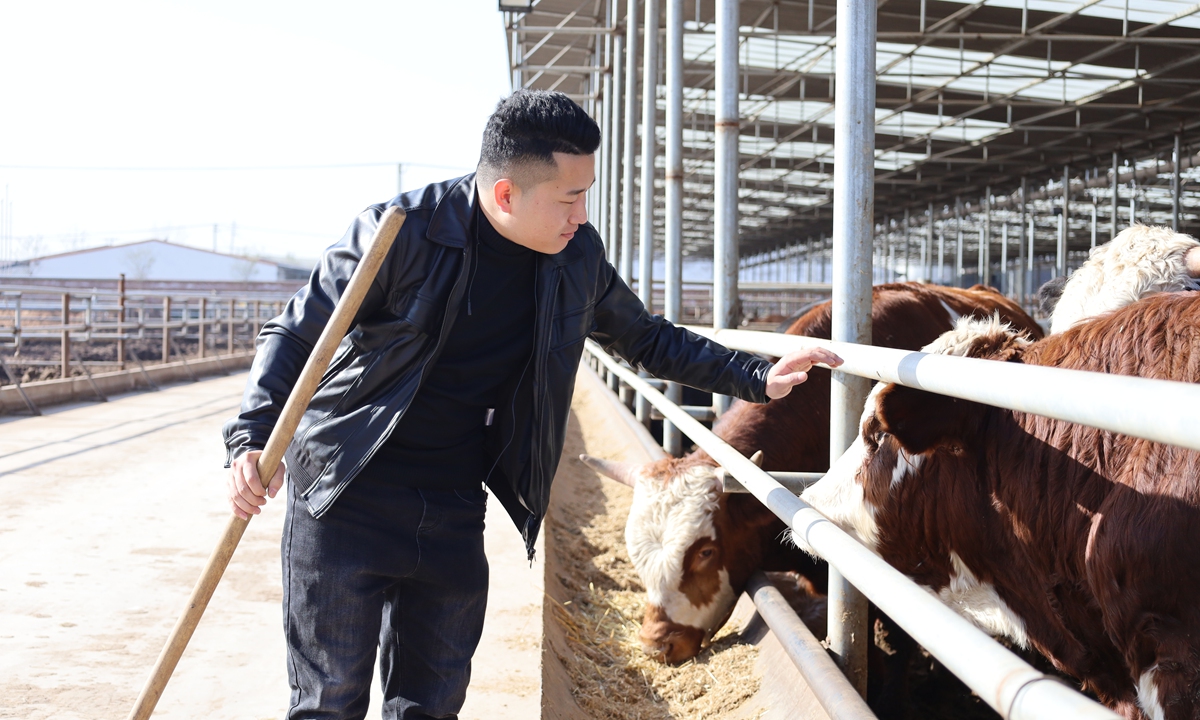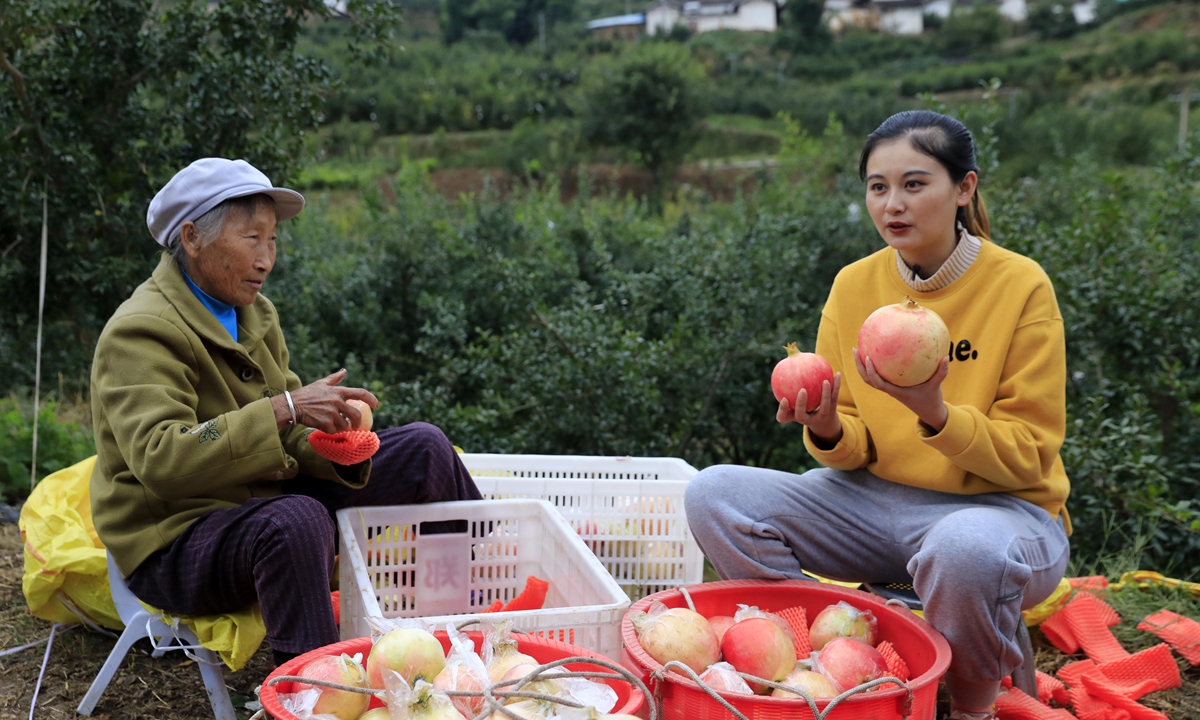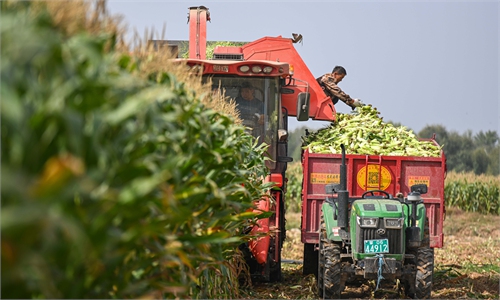IN-DEPTH / IN-DEPTH
Inspired by CPC's mission of rural revitalization, young Party member eyes hometown transformation into e-commerce hub
Home sweet home
Editor's Note:
Who is the Communist Party of China (CPC)? What is the CPC's role in the new era?
The CPC has grown into one of the largest ruling parties in the world in the process of leading the Chinese people in seeking liberation and happiness, making China as strong and prosperous as it is today.
As the CPC ushers the nation into a new era of development, the last decade has witnessed great achievements in national strength and prosperity, with people's confidence and recognition of this path rising to unprecedentedly high levels.
With more than 96 million members, the CPC concluded its 20th National Congress in October, which realized the goals of unifying thinking, fortifying confidence, charting the course for a new era, and boosting morale. The Global Times is publishing a series of stories to help the world understand the CPC in this new era, through stories from CPC members working on the frontlines of various fields, as well as through observations made by respected scholars.
This installment shares the story of a Generation-Z CPC member's return to his hometown to help build a more beautiful and prosperous Chinese countryside through his e-business ventures.

China has been striving to better develop its rural areas and improve the well-being of over 36 percent of the nation's population that calls the Chinese countryside home.
Inspired by a mission for common prosperity, Chinese countryside is seeing the mass return of many of China's Generation Z - those born between the late 1990s and early 2000 who also yearn for a more relaxed lifestyle.
Li is one such individual making up China's wave of rural returnees transforming the face of China's countryside.
Xi Jinping, general secretary of the CPC Central Committee and Chinese president, called for efforts to advance rural revitalization across the board and ceaselessly strive for the modernization of agriculture and rural areas during his recent inspection tours to Shaanxi Province's Yan'an city and Henan Province's Anyang city, the Xinhua News Agency reported.
He encouraged the younger generation to carry forward the spirit of staying tough and diligent, self-reliant and hard-working, and leave a memorable legacy in history with their youthful enthusiasm.
As China announced the eradication of extreme poverty, rural areas have turned a new page in the country's chapter of rural revitalization. More Gen Zers, emerging as the main consumers and primary labor force, are increasingly choosing to return to their rural homes to start their own businesses, driven by their novel knowledge and fresh ideas, becoming an indispensable force in rural development.
Over the last decade, some 11.2 million people have returned to China's rural areas to set up their own businesses as of March this year, with each entity creating six to seven stable jobs on average, according to the Ministry of Agriculture and Rural Affairs.
Most of their entrepreneurial endeavors receive support from local governments with subsidies, training programs, and loans. Riding the wave of e-commerce or livestreaming, many young graduates have moved into the business of selling agricultural produce or handicrafts online.

Creativity leads to common prosperity
Born in 1996, Li Shixuan is now a widely-known e-commerce network savant in Wenshui county, North China's Shanxi Province. Through his e-commerce platform, more than 230 million yuan-worth of the local specialty Chinese royal pear and other local farm products have been sold nationwide.
Many local breeding farms, slaughterhouses, processing plants, and distributors along the chain have benefited from such orders. And nearly a hundred Gen Zers have been inspired by Li to join the e-commerce industry, themselves becoming practical pioneers of rural revitalization.
Li's e-commercial attempts started in 2015. Using e-commerce to supply products to manufacturers nationwide was challenging for Li when he was in college. Due to strategic miscalculations, he lost more than 600,000 yuan by the time he graduated from college.
After suffering such massive losses, Li returned to his hometown Wenshui, and for a time was addicted to video games, feeling lost about life.
In late 2019, Li started to better appreciate his hometown's treasure trove of opportunities. For starters, the local specialty Chinese royal pear had become increasingly popular every year.
"I thought it could be branded as a local 'cultural IP,' because a legend portrays the Chinese royal pear as one of the favorite fruits of Empress Wu Zetian (624-705), the first and only empress in China's history, who was a native of Wenshui county," Li told the Global Times.
The pear is well known for its juicy taste and excellent quality, and over 600 hectares of local land is used for Chinese royal pear cultivation. Li saw great business opportunities therein.
Li regained his courage, contacting professional merchants to cooperate in processing, packaging, delivering, and e-commerce sales.
Locally produced pork is also a popular product in Li's e-commerce shop. "I put up very detailed information of each piece of pork on my shelves, such as where the meat was sourced and how the animals were raised. That then became a blueprint for other merchants to follow to enhance credibility," Li told the Global Times.
He had a particularly good year in 2020 as his e-commerce shop sold more than 80 million yuan worth of pork.
Expectedly, many local "old school" farmers were initially reluctant to open up online sales channels due to the operational difficulties and increased costs.
They preferred to store their autumn pears in a freezer and resell them off-season. In early 2021, the local ripe honey pear was widely unsellable due to extremely poor market conditions. "I then persuaded the farmers to have a try online, and we were finally able to sell over 800,000 kilograms of pears before the new pears ripened. Since then, e-commerce has become popular among locals, and more merchants are encouraged to start exploring opportunities on the e-commerce platform," said Li.
Besides e-commerce, Li is also trying to build a live-streaming team and conduct special e-commerce training programs in his hometown to pass on more knowledge and experience to his fellow villagers.
Nowadays, Li's team is 30 members strong, bringing new vitality to the local economy and boosting employment.
"I believe that the e-commerce industry in my hometown has a bright future. Next, we will cooperate with the local government and turn our town into an e-commerce hub. We hope to attract more returning Gen Z entrepreneurs and inject vitality into rural revitalization."

China is increasing rural development efforts, with the Report on the Work of the Government released in March emphasizing boosting agricultural production and promoting comprehensive rural revitalization in 2022.
The central government has introduced various guidelines and laws to encourage local governments to cultivate and attract talent to boost rural revitalization.
It is also reflected in a number of policy documents, including a white paper called "Youth of China in the New Era" published in April.
According to the white paper, as of 2021, about 470,000 young people were involved in implementing China's rural revitalization strategy at the grassroots level, contributing to the educational, agricultural, and healthcare sectors.
A report from leading Chinese e-commerce platform Pinduoduo in 2021 revealed that the number of Gen Z farmers returning to rural China exceeded 126,000 as of October 2021, accounting for more than 13 percent of agricultural-related vendors on the platform.
Saying goodbye to "neijuan" culture in urban China, which roughly means that "people are competing for limited resources," more Gen Z graduates are breaking with tradition and seeking their fortunes in rural areas - a new path with both opportunities and challenges.
As a Party member, Li said he deeply understands the essence of CPC's concept of rural revitalization.
Solving issues related to agriculture, rural areas, and farmers has always been a top priority for the CPC, he said. As the campaign expands, younger, highly-skilled personnel are expected to play a more important role in promoting modern agriculture and becoming new generation farmers, he noted.
Who is the Communist Party of China (CPC)? What is the CPC's role in the new era?
The CPC has grown into one of the largest ruling parties in the world in the process of leading the Chinese people in seeking liberation and happiness, making China as strong and prosperous as it is today.
As the CPC ushers the nation into a new era of development, the last decade has witnessed great achievements in national strength and prosperity, with people's confidence and recognition of this path rising to unprecedentedly high levels.
With more than 96 million members, the CPC concluded its 20th National Congress in October, which realized the goals of unifying thinking, fortifying confidence, charting the course for a new era, and boosting morale. The Global Times is publishing a series of stories to help the world understand the CPC in this new era, through stories from CPC members working on the frontlines of various fields, as well as through observations made by respected scholars.
This installment shares the story of a Generation-Z CPC member's return to his hometown to help build a more beautiful and prosperous Chinese countryside through his e-business ventures.

Photo: VCG
How do you sell 2.1 million yuan ($0.29 million) worth of products in a single day? This is a hard question for most young people living in megacities. But for Li Shixuan, who returned to rural China to seek career opportunities, it was an achievable number for his e-commerce business on China's Double 11 online shopping festival.China has been striving to better develop its rural areas and improve the well-being of over 36 percent of the nation's population that calls the Chinese countryside home.
Inspired by a mission for common prosperity, Chinese countryside is seeing the mass return of many of China's Generation Z - those born between the late 1990s and early 2000 who also yearn for a more relaxed lifestyle.
Li is one such individual making up China's wave of rural returnees transforming the face of China's countryside.
Xi Jinping, general secretary of the CPC Central Committee and Chinese president, called for efforts to advance rural revitalization across the board and ceaselessly strive for the modernization of agriculture and rural areas during his recent inspection tours to Shaanxi Province's Yan'an city and Henan Province's Anyang city, the Xinhua News Agency reported.
He encouraged the younger generation to carry forward the spirit of staying tough and diligent, self-reliant and hard-working, and leave a memorable legacy in history with their youthful enthusiasm.
As China announced the eradication of extreme poverty, rural areas have turned a new page in the country's chapter of rural revitalization. More Gen Zers, emerging as the main consumers and primary labor force, are increasingly choosing to return to their rural homes to start their own businesses, driven by their novel knowledge and fresh ideas, becoming an indispensable force in rural development.
Over the last decade, some 11.2 million people have returned to China's rural areas to set up their own businesses as of March this year, with each entity creating six to seven stable jobs on average, according to the Ministry of Agriculture and Rural Affairs.
Most of their entrepreneurial endeavors receive support from local governments with subsidies, training programs, and loans. Riding the wave of e-commerce or livestreaming, many young graduates have moved into the business of selling agricultural produce or handicrafts online.

Li Shixuan at a local cattle farm in Wenshui county, North China's Shanxi Province on November 11, 2021 Photo: Courtesy of Li
Creativity leads to common prosperity
Born in 1996, Li Shixuan is now a widely-known e-commerce network savant in Wenshui county, North China's Shanxi Province. Through his e-commerce platform, more than 230 million yuan-worth of the local specialty Chinese royal pear and other local farm products have been sold nationwide.
Many local breeding farms, slaughterhouses, processing plants, and distributors along the chain have benefited from such orders. And nearly a hundred Gen Zers have been inspired by Li to join the e-commerce industry, themselves becoming practical pioneers of rural revitalization.
Li's e-commercial attempts started in 2015. Using e-commerce to supply products to manufacturers nationwide was challenging for Li when he was in college. Due to strategic miscalculations, he lost more than 600,000 yuan by the time he graduated from college.
After suffering such massive losses, Li returned to his hometown Wenshui, and for a time was addicted to video games, feeling lost about life.
In late 2019, Li started to better appreciate his hometown's treasure trove of opportunities. For starters, the local specialty Chinese royal pear had become increasingly popular every year.
"I thought it could be branded as a local 'cultural IP,' because a legend portrays the Chinese royal pear as one of the favorite fruits of Empress Wu Zetian (624-705), the first and only empress in China's history, who was a native of Wenshui county," Li told the Global Times.
The pear is well known for its juicy taste and excellent quality, and over 600 hectares of local land is used for Chinese royal pear cultivation. Li saw great business opportunities therein.
Li regained his courage, contacting professional merchants to cooperate in processing, packaging, delivering, and e-commerce sales.
Locally produced pork is also a popular product in Li's e-commerce shop. "I put up very detailed information of each piece of pork on my shelves, such as where the meat was sourced and how the animals were raised. That then became a blueprint for other merchants to follow to enhance credibility," Li told the Global Times.
He had a particularly good year in 2020 as his e-commerce shop sold more than 80 million yuan worth of pork.
Expectedly, many local "old school" farmers were initially reluctant to open up online sales channels due to the operational difficulties and increased costs.
They preferred to store their autumn pears in a freezer and resell them off-season. In early 2021, the local ripe honey pear was widely unsellable due to extremely poor market conditions. "I then persuaded the farmers to have a try online, and we were finally able to sell over 800,000 kilograms of pears before the new pears ripened. Since then, e-commerce has become popular among locals, and more merchants are encouraged to start exploring opportunities on the e-commerce platform," said Li.
Besides e-commerce, Li is also trying to build a live-streaming team and conduct special e-commerce training programs in his hometown to pass on more knowledge and experience to his fellow villagers.
Nowadays, Li's team is 30 members strong, bringing new vitality to the local economy and boosting employment.
"I believe that the e-commerce industry in my hometown has a bright future. Next, we will cooperate with the local government and turn our town into an e-commerce hub. We hope to attract more returning Gen Z entrepreneurs and inject vitality into rural revitalization."

A Gen Zer He Shuang (right) pitches different types of pomegranates on e-commerce platforms at a village in Huili, Southwest China's Sichuan Province on October 10, 2022. Photo: cnsphoto
Seeking creative life in rural ChinaChina is increasing rural development efforts, with the Report on the Work of the Government released in March emphasizing boosting agricultural production and promoting comprehensive rural revitalization in 2022.
The central government has introduced various guidelines and laws to encourage local governments to cultivate and attract talent to boost rural revitalization.
It is also reflected in a number of policy documents, including a white paper called "Youth of China in the New Era" published in April.
According to the white paper, as of 2021, about 470,000 young people were involved in implementing China's rural revitalization strategy at the grassroots level, contributing to the educational, agricultural, and healthcare sectors.
A report from leading Chinese e-commerce platform Pinduoduo in 2021 revealed that the number of Gen Z farmers returning to rural China exceeded 126,000 as of October 2021, accounting for more than 13 percent of agricultural-related vendors on the platform.
Saying goodbye to "neijuan" culture in urban China, which roughly means that "people are competing for limited resources," more Gen Z graduates are breaking with tradition and seeking their fortunes in rural areas - a new path with both opportunities and challenges.
As a Party member, Li said he deeply understands the essence of CPC's concept of rural revitalization.
Solving issues related to agriculture, rural areas, and farmers has always been a top priority for the CPC, he said. As the campaign expands, younger, highly-skilled personnel are expected to play a more important role in promoting modern agriculture and becoming new generation farmers, he noted.

